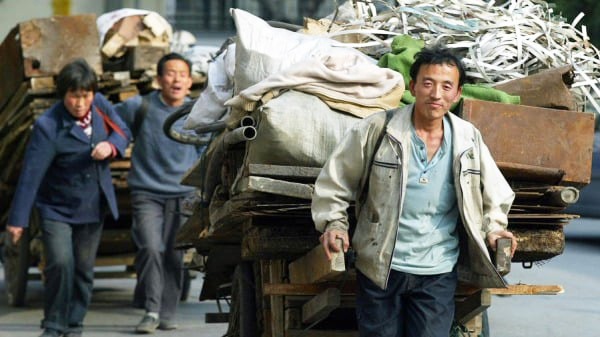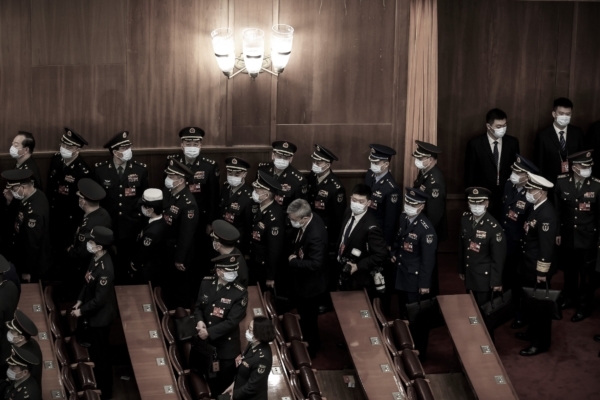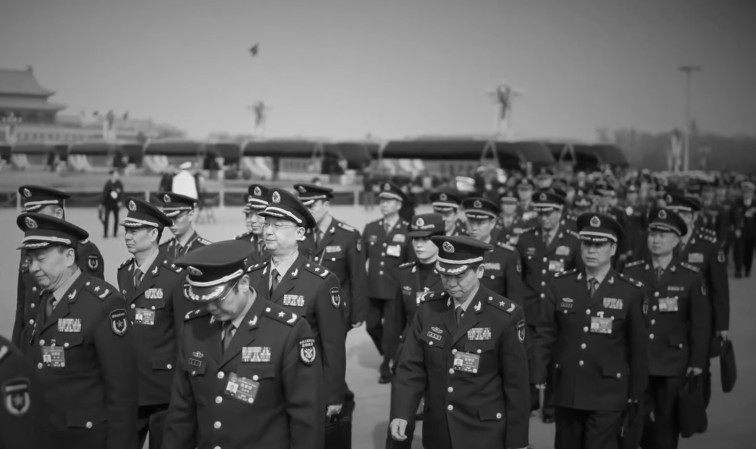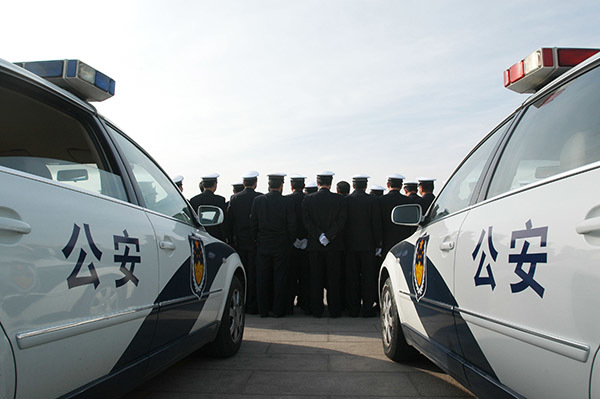On March 5, 2025, PLA delegates arrive at the Great Hall of the People in Beijing to attend the opening of the National People's Congress. (Photo by Kevin Frayer/Getty Images)
[People News] August 1 marks the so-called 'Army Day' of the Chinese Communist Party. What strikes observers as unusual is that the military did not hold a ceremony to promote generals. This ceremony has been a tradition since the eras of Jiang Zemin and Hu Jintao, as well as during Xi Jinping's early tenure. Particularly now, as military leaders are being purged and severely affected, Xi Jinping surprisingly did not promote any generals.
According to a report from Xinhua News Agency, the Ministry of National Defence hosted a reception at the Great Hall of the People on July 31. Liu Zhenli, a member of the Central Military Commission and Chief of the Joint Staff Department, and Zhang Shengmin, a member of the Central Military Commission and Secretary of the Military Discipline Inspection Commission, were present at the event. Minister of Defence Dong Jun also attended and delivered a speech.
Additionally, CCTV reported that Xi Jinping signed an order to commend two units and five individuals. Observers noted that the CCP did not hold a ceremony to promote generals this year.
Independent commentator Chen Pokong remarked on his social media channel that since last year, a significant number of generals have been dismissed, and logically, Xi Jinping should have promoted some generals. Not only should he have done so, but there is also an urgent need for such promotions.
Since taking office, among the 79 generals promoted by Xi Jinping, at least 10 have been investigated or dismissed by the authorities. This includes former Minister of Defence Wei Fenghe, Li Shangfu, former Air Force Commander Ding Laihang, former Rocket Force Commander Li Yuchao and Zhou Yaning, Political Work Department Director Miao Hua, as well as the Commander of the Strategic Support Force Ju Qiansheng and the Political Commissar of the Rocket Force Xu Zhongbo, who were dismissed without public explanation.
Additionally, 12 individuals, while not officially reported as having fallen from grace, are suspected of being under investigation or have gone missing. This group includes He Weidong, Vice Chairman of the Central Military Commission, Qin Shutong, Political Commissar of the Army, Yuan Huazhi, Political Commissar of the Navy, Wang Haijiang, Commander of the Western Theater Command, Lin Xiangyang, Commander of the Eastern Theater Command, Wang Xiubin, Commander of the Southern Theater Command, Wang Renhua, Secretary of the Political and Legal Committee of the Central Military Commission, He Hongjun, Executive Deputy Director of the Political Work Department, Wang Chunning, Commander of the Armed Police, Political Commissar Zhang Hongbing, and the current Commander of the Rocket Force, Wang Houbin. A conservative estimate indicates that 22 generals promoted during Xi Jinping's tenure have faced issues, representing over 20% of those promoted.
Chen Pokong argues that in this context, it is quite unusual for Xi Jinping not to promote any generals on August 1st. He identifies three potential reasons for this lack of promotions.
One possibility is that Xi Jinping's ability to promote generals is no longer as unrestricted as it once was. Following last year's Third Plenary Session, there has been a strengthening of collective leadership within the party, including the collective leadership of the Central Military Commission. Zhang Youxia, Zhang Shengmin, and Liu Zhenli are aligned with one faction, while Xi Jinping finds himself in a weaker position. Consequently, it is possible that the candidates for promotion he suggested were not approved by the other three members of the military commission. Likewise, he may have disagreed with the candidates proposed by others. Ultimately, as the Chairman of the Military Commission, this tug-of-war resulted in no promotions to general.
The second possibility is that Xi Jinping may no longer possess the qualifications to promote generals. Such promotions require the collective agreement of the Central Military Commission. 'People can argue that all the generals you have promoted in recent years have encountered problems; what qualifications do you have to promote generals now?' This suggests a reduction in Xi Jinping's military authority.
Another possibility is that prior to the grand military parade on September 3, there could be a sudden promotion of generals, either a group or just one individual. This scenario is plausible, but it will likely lead to a tug-of-war within the Central Military Commission.
Professor Zhang Tianliang from Feitian University offered two interpretations in his self-media channel 'Tianliang Lunzheng'.
The first interpretation suggests that if Xi Jinping has not lost power, 'I believe Xi Jinping has a tendency to procrastinate. The situation with Qin Gang was delayed for a year before it was announced, and even now, a replacement for Wang Yi has not been identified. Therefore, Xi Jinping is indeed very slow in his decision-making.'
The second interpretation posits that it is more likely that Xi Jinping is uncertain about who is truly loyal to him. 'If Miao Hua can also turn against Xi, then Xi Jinping wouldn't know whom to trust,' Zhang Tianliang remarked.
Zhang Tianliang noted that there are still over two months until the Fourth Plenary Session, and we can wait and observe. However, he stressed that at the Fourth Plenary Session, Xi Jinping needs to elect a new vice chairman of the Central Military Commission; otherwise, the daily operations of the Military Commission have long been dictated solely by Zhang Youxia, which indeed undermines Xi Jinping's authority.
It is important to highlight that Dong Jun, who was appointed on December 29, 2023, to succeed the abruptly dismissed Li Shangfu as Minister of National Defence, has yet to be promoted to a Central Committee member or State Councillor.
Chen Pokong pointed out that this indicates Dong Jun is facing resistance within the military, which puts Xi Jinping, who promoted him, in a rather awkward position.
Since the 1980s, it has generally been the case that the Minister of National Defence of the Communist Party of China is concurrently a State Councillor and is typically a military officer of a rank higher than that of a Central Military Commission member who oversees the daily operations of the Military Commission.
On November 27, 2024, the British Financial Times reported that Dong Jun is under investigation for corruption, according to current and former officials from the U.S. Department of Defence. On the same day, Mao Ning, spokesperson for the Chinese Ministry of Foreign Affairs, responded to a question from a Japanese reporter at a regular press conference with a brief remark: 'catching the wind and grasping shadows.'
(Originally published by People News) △











News magazine bootstrap themes!
I like this themes, fast loading and look profesional
Thank you Carlos!
You're welcome!
Please support me with give positive rating!
Yes Sure!